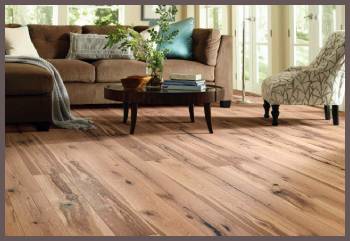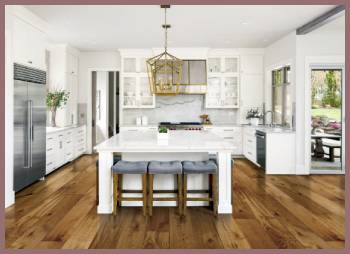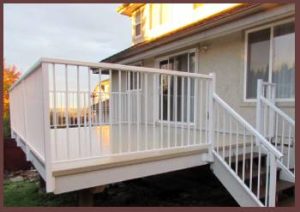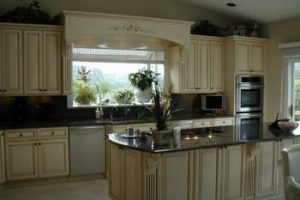In the great debate of hardwood flooring vs engineered wood flooring, many homeowners feel stuck. Both have their allure, but there’s more than meets the eye when it comes to these popular choices.
So, let’s navigate the world of wood flooring, evaluating the pros and cons of each, to help you make an informed decision about your next home renovation project.
A Brief Comparison Table
| Comparison Points | Hardwood Flooring | Engineered Wood Flooring |
| Material | Solid wood | Composite: a top layer of real wood and base layers of plywood |
| Lifespan | Decades to centuries | Varies widely, typically less than hardwood |
| Durability | High, but can be prone to warping and scratches | High, and less susceptible to warping |
| Maintenance | Requires regular maintenance and refinishing | Generally lower maintenance |
| Refinishing | Can be refinished multiple times | Limited by the thickness of the top layer |
| Sensitivity to Moisture | High sensitivity, can warp or cup | More stable in the face of humidity and temperature changes |
| Installation | Requires professional installation | Easier and less expensive to install |
| Cost | Typically more expensive | Can range from less expensive to as expensive as hardwood, depending on quality |
| Eco-Friendliness | Natural and recyclable material | Depends on manufacturing process, but generally less eco-friendly than hardwood |
| Impact on Home Value | Likely to increase home value | Likely to increase home value |
Chapter 1: Unmasking Hardwood Flooring

Real hardwood flooring has been a staple in homes for centuries. Known for its natural beauty and durability, it’s a classic choice that never goes out of style.
The Pros of Hardwood Flooring
A significant advantage of hardwood flooring is its lifespan. With the right maintenance, it can last for decades – even centuries. It can also be sanded and refinished several times over its life, allowing you to change the look or repair damage without needing to replace the entire floor.
Hardwood floors are also an eco-friendly choice. They’re produced from natural materials and can be recycled at the end of their lifespan.
The Cons of Hardwood Flooring
Despite its benefits, hardwood flooring isn’t perfect. It can be sensitive to moisture and humidity changes, leading to warping or cupping. Moreover, hardwood floors can be quite noisy when walked upon, especially in older homes.
Lastly, the price point can be a deterrent for some. Quality hardwood flooring can be expensive, and the cost of installation can add up.
Read More: About Paradigm LVP Flooring
Chapter 2: Embracing Engineered Wood Flooring

On the other side of the coin, we have engineered wood flooring. A modern innovation, it features a top layer of real wood with a core of multiple layers of plywood.
The Pros of Engineered Wood Flooring
Engineered wood flooring shares many of the aesthetic benefits of hardwood, as it too has a layer of real wood on top. However, it comes with an added advantage: stability. The multilayer construction of engineered wood flooring makes it less susceptible to warping due to changes in temperature or humidity.
Another perk is the easier installation process. Some engineered wood flooring types can be installed as “floating” floors, which are less labor-intensive to install.
The Cons of Engineered Wood Flooring
Engineered wood flooring, while having many benefits, also has its cons. First, although it has a top layer of real wood, that layer can be quite thin, limiting the number of times the floor can be sanded and refinished.
Moreover, not all engineered wood is created equal. Lower-quality options might not offer the same durability and longevity as their higher-quality counterparts. Plus, some homeowners feel it lacks the warmth and authenticity that real hardwood brings.
Frequently Asked Questions (FAQs)
Both engineered hardwood and hardwood flooring have their merits. The best choice depends on your personal preferences, the specific needs of the space, and your budget.
The main disadvantages include a shorter lifespan compared to hardwood, a thinner layer of real wood on top, and potential lack of consistency in quality across different brands and ranges.
This isn’t always the case. The price can vary greatly depending on the quality of the materials used. Generally, high-quality engineered hardwood can be more expensive due to its complex construction process.
In terms of appearance, engineered wood can look nearly identical to solid wood. However, it may not last as long or withstand as many refinishing processes as solid wood can.
The best type of wood flooring largely depends on your individual needs. For longevity and the ability to refinish multiple times, solid hardwood is excellent. For rooms with high moisture or temperature fluctuations, engineered wood flooring could be a better option.
Yes, they can! Both engineered wood and solid hardwood are considered upgrades to standard materials like carpet or vinyl, so they can both potentially increase your home’s value.
Read More: About NuCore Rigid Core Flooring
The Final Analysis
At the end of the day, the choice between hardwood flooring and engineered wood flooring is highly personal. It depends on your lifestyle, your budget, and the specific conditions in your home. Hardwood flooring offers unrivaled longevity and a timeless look but requires more maintenance and doesn’t handle moisture well. On the other hand, engineered wood flooring provides better stability and can be more affordable, but it doesn’t last as long and can’t be refinished as many times.
No matter which you choose, both hardwood and engineered wood flooring can bring warmth, beauty, and value to your home. As you consider your options, remember that the best choice is the one that will make you happiest in the long run.
Your home, your rules. May your floors always be a reflection of your taste and the backdrop to a wealth of cherished memories.



